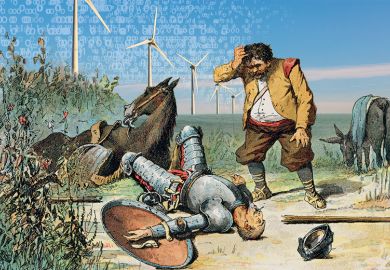This book begins promisingly by contrasting the development of a human child with that of a baby wildebeest, apparently a particularly precocious species: the wildebeest learns to walk and run "in a matter of minutes" after birth, and then has little left to learn. The human child, on the other hand, never stops learning; and the most important things learned are to do with words.
"(I)t takes two full years before a baby human... learns to talk. And it is another ten years before the human child learns to talk back. Even then,it is an immature criterion that would claim the teenager has mastered language."
These points merit emphasis, in an age when many theorists of linguistics claim that language is an innate "instinct". But the rest of Donald Loritz's book never fulfils the promise of his first page. What I think he is trying to do is to show how biological evolution, starting from single-celled organisms, might have brought into being creatures capable of learning to communicate in increasingly complex ways, without the detailed structure of communication systems ever becoming innate (as writers such as Steven Pinker and Noam Chomsky believe it has). This interpretation makes the book sound more systematic than it is, though. It sometimes reads like a presentation on "everything I know about neurology" more than an organised exposition of a specific thesis.
Even when he makes worthwhile points, Loritz forfeits the reader's sympathy by combining glib flippancy with factual ignorance. Until the 19th-century invention of bullets that reliably flew straight, Loritz tells us, "armies would line themselves up, shoulder to shoulder, in order to give the opposing team a reasonable chance". This cannot be intended as a serious explanation of military tactics. The reason why research funding in the United States was withdrawn from machine translation after 1966, Loritz says, is that "evil as the Evil Empire might have been, the United States was at the time gearing up its war on Vietnam, and Russian-English machine translation was not going to be of immediate help". That might sound like a plausible explanation, but it is wrong. Machine translation was dropped because it was more expensive than human translation, and because no use could be made of significantly increased volumes of translated material.
Loritz explains the idea that speakers become insensitive to phonetic differences that are non-distinctive in their language by saying that this starts "in adolescence, when children begin not to hear when their parents ask them to do something". Doubtless some students who come across the book will earnestly retail this in next year's exam scripts, but Loritz surely knows that it is nonsense: the insensitivity is acquired in the early months of life, and has nothing to do with inattention to whole utterances.
Loritz identifies some unscholarly attitudes among his intellectual opponents. He quotes passages from Chomsky's writings, in one of which Chomsky describes all attempts to study the evolution of human language from pre-human cognition as "hogwash". However, arrogant bluster on one side of an academic debate does not justify snide flippancy on the other side. What is wrong with sober, careful scholarship?
Geoffrey Sampson is professor in computer science and artificial intelligence, University of Sussex.
How the Brain Evolved Language
Author - Donald Loritz
ISBN - 0 19 511874 X
Publisher - Oxford University Press
Price - £35.00
Pages - 2
Register to continue
Why register?
- Registration is free and only takes a moment
- Once registered, you can read 3 articles a month
- Sign up for our newsletter
Subscribe
Or subscribe for unlimited access to:
- Unlimited access to news, views, insights & reviews
- Digital editions
- Digital access to THE’s university and college rankings analysis
Already registered or a current subscriber? Login



